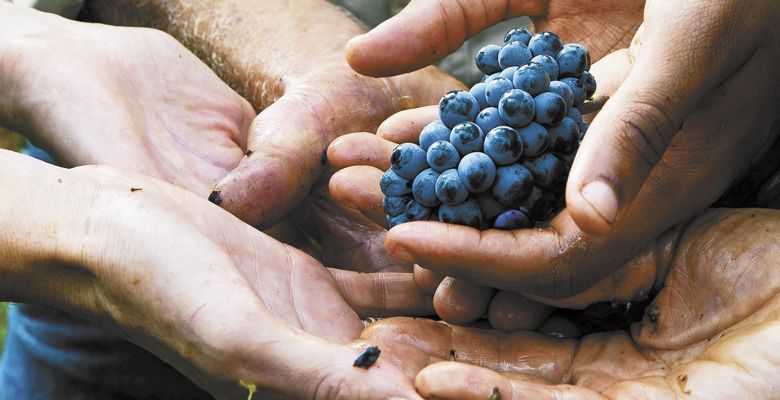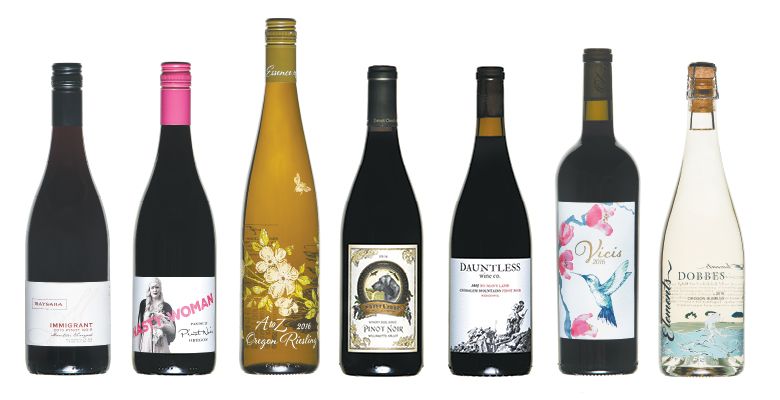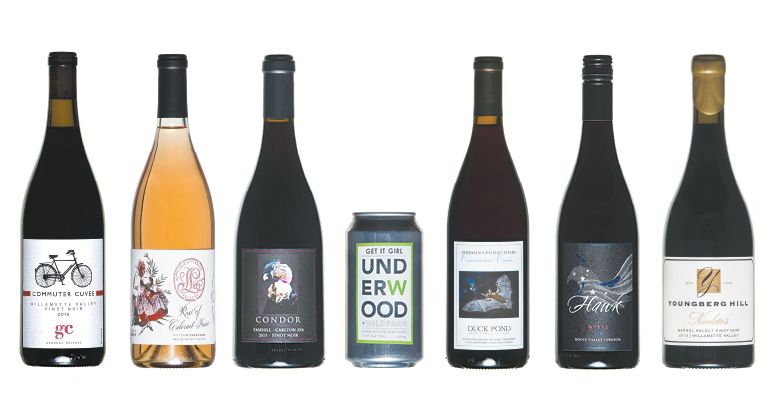Charitable Bunch
Wineries lend a hand raising money for causes close to the heart
In Oregon, a remarkable number of producers are willing to part with a portion of their profits for a greater good, whether a fundraiser honoring the life of someone recently lost, an association working to protect water quality or the all-important agency supporting immigrants as they navigate the increasingly tricky path to citizenship.
This writer credits awareness; every good vintner has this trait. It extends beyond the preoccupation with weather throughout the growing season, the detection of flaws in the glass and the ability to choose barrels worthy of a specific blend. It also involves identifying social, economic and environmental needs and responding accordingly, with a signature touch of Oregon wine country generosity. Better still, it requires quality wines from resident producers.
One of the Willamette Valley’s shining examples of philanthropy is ¡Salud! The Oregon Pinot Noir Auction, raising funds to help provide health care services and outreach to industry vineyard workers, has been going strong for more than 25 years. Tuality Healthcare offers the medical aid while winemakers and auction attendees contribute one-of-a-kind wines and bids, respectively. Last year, ¡Salud! bested its previous record by raising more than $1 million for the program. It is estimated the event has contributed nearly $13 million since its inception. This year’s affair takes place Nov. 10–11.
Frequently, the gesture appears a bit more subtle. Countless producers have donated complimentary tasting certificates, vineyard tours and exclusive bottles to an even larger list of noble agencies, nonprofits, environmental groups and social organizations, not to mention can drives for local food banks and checks written to charities near and far.
Leah Jorgensen of her eponymous brand is putting her first rosé of Cabernet Franc to work. Part of the profits from the wine made with fruit from Buxton Ranch in the Rogue Valley benefits women’s scholarships. Her alma mater, Sweet Briar College in Virginia, is on the shortlist of beneficiaries. Jorgensen’s label declares an appreciation of the sciences, and her contribution to academia only furthers that fondness.
“After the election, I feel especially triggered around the topic of gender equality, opportunity and equal pay for the same job,” Jorgensen commented.
Previously, the winemaker set aside some time to coach varsity lacrosse, empowering young women through that platform. Now, with an expanding label in hand, she lets her wine carry some of the social justice and enrichment load.
“While work experience is important, I believe education is critical,” she continued. “I want to inspire school-aged girls to reach for the moon — to strive for degrees in higher education in STEM, and to have the self-confidence and support needed to succeed.”
Atop the Dundee Hills, Vista Hills Vineyard also invests in the future of students, specifically those working while enrolled in school. Ten percent of the brand’s profits benefit the Clint Foundation, started by Vista Hills owners John and Nancy McClintock in 1983.
The foundation has helped more than 340 students finish their undergraduate degrees. Fifteen schools around the U.S. participate in the program, including Chemeketa Community College, Linfield College, George Fox University, Lewis & Clark College and Marylhurst University.
The schools choose the recipients, who are strongly encouraged to “pay it forward” in terms of public service and commitment to community, wherever they happen to live post-graduation. From volunteering in food banks and domestic assault shelters, to serving as court representatives for children, to other amazing opportunities, Clint Foundation scholars learn far more than what is simply taught in class.
College-bound or not, those who’ve recently arrived in the U.S. can find comrades at Maysara Winery. The McMinnville winery has created a Pinot Noir dedicated to all immigrants. It’s a natural move for Moe and Flora Momtazi, who, uprooted from Iran, immigrated to Dallas, Texas, in 1983 — after Moe had earned an engineering degree from the University of Arlington in Texas in the ’70s and returning to Iran. From the Big D, they relocated to Marietta, Georgia, and, finally, Oregon, where the couple founded one of the area’s most respected vineyards in the late 1990s.
Now in its second generation with daughters Tahmiene, Naseem and Hanna involved in both winery and vineyard, Maysara is the definition of achieving the American Dream. One-third of the profits from Maysara “Immigrant” Pinot Noir goes to refugee and immigrant programs servicing permanent residency, family-based visas, low-cost immigration counseling and much more.
For some winemakers, such as John Grochau, the philanthropic focus shifts year to year; with every vintage of his Commuter Cuvéee Pinot Noir, he chooses a new charity. His most recent release, 2016, supports Chefs Cycle for No Kid Hungry, a three-day endurance ride wherein sponsored chefs from around the country pedal to help end childhood hunger. It’s a fitting choice for Grochau, whose love of wine began in his 20s while racing cycles in central France and has raced in the U.S. and Belgium. Founded in 2002, Grochau Cellars started Commuter Cuvée with the 2007 vintage — released in 2009 — to support a bicycle safety and awareness fund at the BTA (Bicycle Transportation Alliance) in the name of the late Brett Jarolimek.
“I didn’t know Brett, but he worked at the Bike Gallery in Portland, a store [where] I worked for five years,” Grochau explained. “He was unfortunately killed while riding his bike to work; the accident happened a mile from my house. I ride past the accident site often as it is on my route to my office.”
Philanthropic collaboration not only exists among wineries but with other kinds of companies, too. Union Wine Company, largely known for its backpack-ready canned wines, recently released Get It Girl Oregon White Blend, a collaboration with Wildfang, a modern feminist clothing shop in Portland. As longtime friends, Union founder Ryan Harms and Wildfang CEO Emma McIlroy wanted to work together on a project, which led to this highly accessible blend of Riesling, Gewürztraminer and Pinot Gris.
The limited-edition wine marks Union’s largest contribution to charity yet, with all wine sales going to Planned Parenthood. Union’s aiming high at a $100,000 charitable objective, an admirable vision.
“This is a very male-dominated industry,” said Union’s Kyna Williams. “And in our society, there are still a lot of inequities. It feels right to stand up as a company and say, ‘This is important to us.’”
For Chehalem Winery, giving to community causes has always been part of its mission, but last spring, the Newberg company raised the bar with its inaugural “Making a Case for Giving” campaign. The aim was to donate 100 cases of wine, valued around $40,000, to charities throughout the month of May, otherwise known as Oregon Wine Month.
“Giving back is in Chehalem’s DNA,” said founder/co-owner Harry Peterson-Nedry. “In the 30-plus years we’ve been in business, we’ve committed ourselves to supporting and contributing to the communities around us.”
Chehalem plans to do the same every May going forward, utilizing Oregon wine as a stepping stone toward a greater good. Nonprofits based in the state or Southwest Washington are encouraged to apply for grants in next year’s installment.
As it often happens, charitable giving can often occur in the wake of a tragic event. Such is the case of Duck Pond Cellars — and other producers — helping rebuild parts of Northern California wine country destroyed by fires. Starting Oct. 13, October, the Fries Family, also owners of Desert Wind Winery in Prosser, Washington, donated five percent of its tasting room and online sales for the month to the North Bay Fire Relief Fund.
The philanthropic spirit is alive in Oregon wine country and should only expand with each passing vintage. It is the responsibility of a thriving industry to give back to the greater community from which it sprouted. The typical winemaker will explain how wine is grown in the vineyard, where unsung heroes put in long days tending vines and harvesting fruit when the time comes.
Wine is produced within a society, not merely inside of a delightful bubble where tasting fees, touring companies, three-figure bottle prices and gift shops run rampant. It can and should be a much-needed distraction now and again, but at its core, wine is a good that can become a service, especially when a label has climbed out of the red and into at least some green.
The Oregon wine industry currently enjoys its most sought-after wines ever, and these winemakers, along with many more not mentioned here, recognize their good fortune and are retuning certain profits to causes desperately depending on them.
Read more of writer Mark Stock’s work at www.markastock.com.
See a need? Fill a glass!
Maysara “The Immigrant” 2015 Pinot Noir
One-third of profits go to refugee and immigrant programs serving permanent residency, family-based visas and more. (See more in story.) Tasting Notes: Dense black cherry and earthy throughout, smooth texture and definitely age-worthy. $45; 446 cases
Nasty Woman Wines “Paintsuit” Pinot Noir NV
Meg Murray created this brand after the 2016 election in order to help promote progress toward women’s equal participation in policy and leadership. Other wines include: Progress Pink, Pave the Way Chardonnay, Boss Lady Bubbles and Represent Red. Tasting Notes: Cherry, leather and pomegranate with a cool, herbal quality. $25; 719 cases
A to Z Wineworks 2016 Riesling
A portion of each bottle goes to OSU’s Honey Bee Lab, which researches honey bee health, and the Xerces Society, a certification and honey bee conservation group. Tasting Notes: Clean with healthy dose of residual sugar, showing poached pear, honey and caramel apple. $15; 11,083 cases
Sweet Cheeks Winery 2016 Dog Series “Kody” Pinot Noir
Greenhill Humane Society in Eugene recently announced the need to rebuild of most of its facility, so dog-friendly Sweet Cheeks is helping by donating 50 percent of profits of this wine series. Other offering includes 2016 “Charlie” Pinot Gris $25; 56 cases. Tasting Notes: Approachable with pie cherry fruit and dried cinnamon. $35; 56 cases
Dauntless Wine “No Man’s Land” 2015 Pinot Noir
All of Dauntless’ net profits assist local veterans’ causes. Dauntless is also farmer-veteran certified by Homegrown By Heroes. The winery was the 2016 OWP Persons of the Year. Tasting Notes: Wädenswil clone affords dark, stewed berries with pepper and clove. $30; 100 cases
Day Wines “Vicis” 2016 Blend
A portion of sales is donated to Facing Our Risk of Cancer Empowered (FORCE), a nonprofit dedicated to improving the lives of individuals and families affected by hereditary breast, ovarian and related cancers. Tasting Notes: (Pinot Noir, Pinot Blanc, Pinot Gris) Floral with deep blue fruit and a bright acidity for balance. $39; 100 cases
Dobbes Family Estate “Elements” 2016 Bubbles
Philanthropy is at the heart of Dobbes Family Estate. The 2016 sparkling helps support the Washed Ashore Project, which builds and exhibits aesthetically powerful art to educate a global audience about plastic pollution in oceans and waterways and spark positive changes in consumer habits. Tasting Notes: (Auxerrois, Pinot Gris and Gewürztraminer) Pear, lemon zest and orange blossoms round out this refreshing sparkling wine. $26; 250 cases
Grochau Cellars 2016 “Commuter Cuvée” Pinot Noir
Chefs Cycle for No Kid Hungry, a fundraising endurance ride, features chefs from around the country fighting hunger outside the kitchen. (See more in story.) Tasting Notes: Clean, grassy and backed by plenty of red fruit. $18; 5,500 cases
Leah Jørgensen Cellars 2016 Rosé of Cabernet Franc
A portion of profits are received by women’s academic scholarships, including Sweet Brian College, Nordic House and others. (See more in story.) Tasting Notes: Pink grapefruit with a dry, slightly savory undercurrent. $20; 110 cases
Condor Wines Northwest 2015 Pinot Noir
In 2007, Elk Cove founder Dr. Joe Campbell volunteered in a small medical clinic in Arequipa, Peru. Before returning to Oregon, Campbell asked his colleagues how he could continue to help. He was told the most critical health need was for food assistance. All proceeds of Condor, Peru’s national bird, contribute to the community’s hunger relief program. More than $150,000 has been raised. Tasting Notes: Blackberries, currants, candied dates and baking spices. $45; 100 cases
Union Wine Co. “Get It Girl” White Wine Blend
Union Wine Co., in collaboration with Portland feminist clothier Wildfang, aims to raise $100,000 for Planned Parenthood with this white blend in a can. (See more in story.) Tasting Notes: Clean and unfussy with pear, jasmine and lemon zest. $28; 4-pack of cans
Duck Pond Cellars “Conservation Cuvée” Pinot Noir, Lot 4
In late 2013, Duck Pond partnered with the Oregon Department of Fish and Wildlife’s Conservation Program to help promote their mission of ensuring healthy habitats for fish, wildlife and people. Lot 4’s label features the Pallid bat, one of Oregon’s species of greatest conservation need. For each bottle sold, $5 will be donated to the program. Tasting Notes: Earthy base with Rainier cherry makes for a medium-bodied, food-friendly wine. $25; 350 cases
2Hawk “9-1-1” c. 1 Rogue Blend
Owners Jen and Ross Allen are giving back to their community with this special wine that supports first-responder organizations in Jackson County. Ross’ 17-year background in law enforcement has given the Allens a deep appreciation for the men and women who often put themselves in peril to keep the rest of us safe. Tasting Notes: (Tempranillo, Grenache, Mourvèdre) Straightforward meaty blend with ripe fruit and a hint of char. $29; 56 cases
Youngberg Hill 2014 Nicolette’s Barrel Select Pinot Noir
The Baileys noticed a community need and wanted to do something about it. A portion of profits from this bottling helps support the homeless children in McMinnville’s school system. Tasting Notes: Cherry and blueberry mingle with greener notes like tea leaf and eucalyptus. $75; 50 cases
- Cameron “This Wine Kills Fascists” 2015 Pinot Noir quickly sold out at a 2017 benefit hosted at Nostrana in Portland. Proceeds were given to the ACLU.
- Through Remy Beneficio Barbera, winemaker Remy Drabkin donates to a host of causes, including Habitat for Humanity and Oregon Special Olympics.
- Twelve Wines donates tasting fees to community charities during Carlton Ladies’ Night, the first Thursday of every other month throughout downtown.
- Coeur de Terre club members blend — and can buy —Sacré Coeur Pinot Noir, a wine available only at charitable auctions, such as Heart’s Delight in Washington, D.C.













